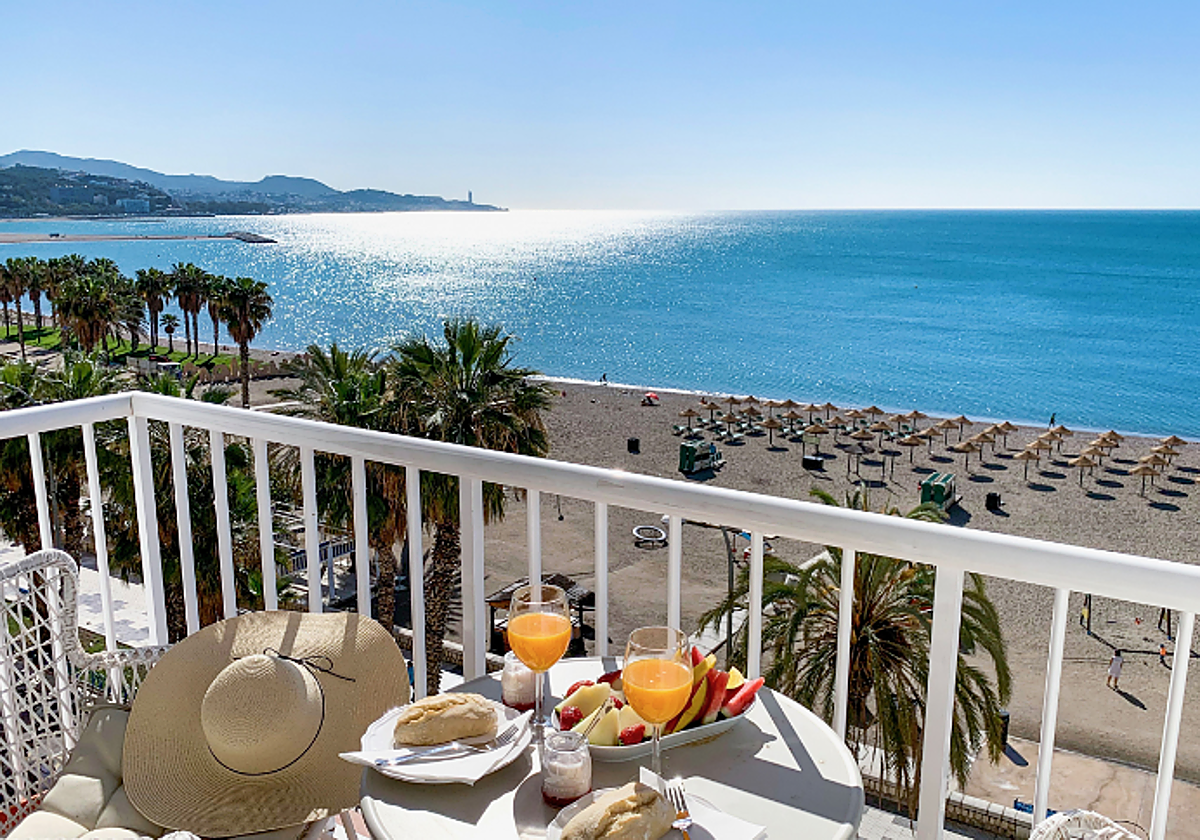Holiday rental property owners hit back: 'Putting all the coast's housing problems down to tourists is a nonsense'
AVVA-Pro insists that a regulated sector cannot become a scapegoat for the shortage of housing when it represents only 2% of the total property stock in the capital of the Costa del Sol while in Malaga province as a whole 15% of all properties stand empty
The tourist housing sector is in the crosshairs of large municipal councils in the south of Spain such as Malaga, Cadiz and Marbella. On a social level too it has become the target to shoot down in the hope of solving the problems of access to housing or affordable rentals in many parts of the Andalucía region. On 29 June, some 15,000 people protested in Malaga against the city's housing crisis and pointed the finger at holiday rental properties as the main perpetrator of this housing crisis. Last Tuesday, Cadiz city council approved the prohibition of holiday homes in the historic part of its city centre in a plenary session.
This measure comes just a few weeks after the mayor of Malaga, Francisco de la Torre, announced the first action in his city to limit the growth of these holiday rental properties - a shock ban on all properties with no independent access from becoming a holiday rental. In other words, limiting this offer to single-family homes or premises, warning that the next step could involve a full ban in areas that have become saturated with such properties. These administrations have framed such actions as being needed, placing them under the protection of the new decree from the regional government on tourist housing in Andalucía. Add to that the express will of the central government to regulate temporary rentals (both short-term and tourist lets) as it has already done with long-term ones.
Alternative solutions
Against this backdrop, the Andalusian Tourist Housing Association (AVVA-Pro) has raised its voice to make it clear, with figures, data and alternative solutions to this problem, that the limitations imposed by the city councils of Malaga and Cadiz are not in line with the provisions of the Junta's decree. AVVA-Pro insists that a regulated sector that pays its taxes cannot become a scapegoat for the shortage of housing when it represents only 2% of the total property stock in the capital of the Costa del Sol, while in the province as a whole there 15% of all properties stand empty.
Carlos Pérez-Lanzac, president of AVVA-Pro, asserts that "we understand that there has to be planning of urban spaces and that the councils want to establish a new city model and we are willing to analyse it as we have been doing for four years with the city council in Malaga, but the limitations that have been laid down have to be done according to the rules of the Junta, which makes it clear that they must be justified measures, i.e. with metrics that confirm that pressure, and proportionate, which means that they are transversal and involve all sectors that generate this saturation: hotels, offices or other places of business. No city council, neither that of Cadiz nor that of Malaga, has implemented the Junta's decree correctly."
Legal proceedings
The association president goes on to stress that "this obligation of legal guarantee is being violated and, when limitations are established in this way, rights are being taken away from the owner", warning that "the association will protect the interests of the sector, especially when there is negligent or irresponsible behaviour on the part of the administration." In the case of the capital of the Costa del Sol, he said that, by the council having set this out as an instruction, it cannot be challenged as a whole because the only legal mechanism the sector can resort to is to "fight case by case. We hope that in Malaga there will be no legal proceedings and that the next steps will be taken in line with this. We are in talks to see what the real and definitive approach will be and we are waiting to see if the work of the last four years on zoning and the establishment of quotas is imposed, on the basis that if the traffic lighting system indicates red zones, we will accept this decision of zero tourist housing, but also of all the activities that influence this tension." In this sense, he gives the example that "in Seville more than 80 hotels have been built since 2016 on land suitable for housing, which would have had capacity for 1,300 homes and 90% are located in the city centre. There are many typologies that put pressure on housing, so we cannot make rules only to limit tourist housing."
Junta decree
It is worth noting that the Junta'a decree, published last February with the consensus of the tourism housing sector, updated the first regulation applied to tourist accommodation in Andalucía back in 2016. The update gives, for the first time, powers to local councils to regulate this activity. However, it specifies that "it is the urban planning instruments or municipal ordinances that can introduce, where appropriate, the corresponding requirements on the compatible or complementary use of this type of housing that serves as tourist accommodation, or introduce other types of sector limitations other than those of tourist planning in accordance with the principles of proportionality, objectivity, necessity and legal certainty."
The text of the decree also details that "the local councils, for imperative reasons of general interest, may establish limitations proportionate to this reason, with regard to the maximum number of dwellings for tourist use per building, sector, area, period, district or zone. Such limitations must be based on clear, unequivocal and objective criteria, which have been duly publicised prior to their application." The president of AVVA-Pro makes it clear that in the case of "Malaga city there has been neither consultation nor criteria of proportionality, nor has the limitation established so far been justified with metrics".
The 29J demonstration
Malaga's 29 June demonstration for affordable housing further highlighted the focus on tourist housing activity that, in the case of the city of Malaga, accounts for some 7,000 properties, representing 4.10% of the residential stock in the province, compared to 1.7% in Andalucía and 1.15% in Spain. In the last financial year they have grown by 5.1% at provincial level, according to data from Spain's INE national statistics institute (INE). In view of the data, AVVA-Pro considers that "the province does not have a disproportionate presence of holiday rental properties. The sector has been consolidated in a responsible manner and has a higher percentage than the average for the region due to the weight and benefits that residential tourism generates as a seaside destination."
In summary, Malaga city has a perfectly acceptable percentage of properties for tourist use that is lower than in the province. Hence Pérez-Lanzac states, with clear unease, that "we do not understand how this tension and legal insecurity can be generated in a regulated sector that pays its taxes. This makes no sense. We are not directly responsible. It is nonsense, it is demagogy. In Spain there is a very important housing problem and it is normal for people to demonstrate, but concepts have been mixed up and it is a global issue for the country and the governing bodies have to find a solution to it. It is absurd to consider that tourist housing is the cause of all ills. There is no market study that points to this sector as a factor causing the problem. Two per cent cannot be a distorting element. For every tourist dwelling there are eight empty ones."
Sector generated 1.91 billion euros in Malaga province
For this reason, Pérez-Lanzac argues that this sector generated 1.91 billion euros in Malaga province of the 4.24 billion euros of business impact that this activity had in Andalucía. The province also contributed 9.3% of the 20.525 billion euros at national level. As to measures to alleviate the current situation of housing shortages, he proposes that the administrations speed up the urban development process, that the councils free up land and that it does not take three years of delays to start any building work. There are also office buildings in disuse that could be changed to residential use, as well as allowing more height in certain parts of cities to build more vertical housing or new housing models such as co-living (groups of homes with some shared facilities) or different ways that are emerging, as well as more public-private agreements to promote social housing.
Pérez-Lanzac's final argument is that in Spain there are 26.6 million homes and the experts have already pointed out that 1% would have to be built every year to cover the demand, some 22,000 per month. Unfortunately, construction is taking place at a rate of only 9,000 per month. This, at a time when there is a greater need for homes because there are more married couples separating, young people leaving the nest and staying in the city or in the province due to the employment opportunities that exist, not to mention the professionals coming from abroad to live and work in the sun with all the tech and business opportunities on offer in Malaga city. "Putting all the housing problems down to tourists is a nonsense", he claimed.

